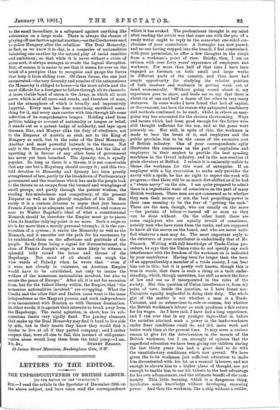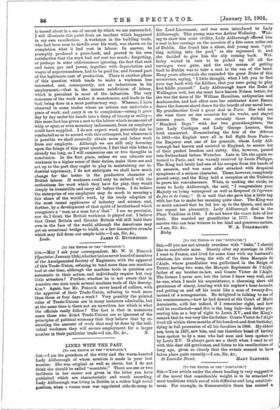LETTERS TO THE EDITOR.
THE ITNPRODUCTIVENESS OF BRITISH LABOUR.
THZ EDITOR, OF THE "SPECTATOP.."] read the article in the Spectator of December 29th on the above subject, and have since read the correspondence which it has evoked. The predominant thought in my mind after reading the article was that some one with the pen of a ready writer ought to reply to the somewhat one-sided con- clusions of your contributor. A fortnight has now passed, and no one having stepped into the breach, I feel constrained, with your permission, to offer a few thoughts in the rough from a workman's point of view. Briefly, then, I am an artisan with over forty years' experience of employers and workmen. For more than half of that time I have been engaged as foreman on both small and large works in different parts of the country, and thus have had ample opportunity for studying the relative position of both master and workmen in getting work out of hand economically. Without going round about it, ray experience goes to show, and leads me to say, that there is about six of one and half a dozen of the other in very many instances. In some works I have found that lack of capital, or discernment, has been the reason why antiquated machinery and methods continued to be used ; whilst in others an easy- going way has accounted for the obvious shortcoming. Ways and means which had been good enough for the father were still thought sufficient for the son, and so the game went leisurely on. But still, in spite of this, the workman is made to bear the brunt of it, and employers and the public proclaim him to be the cause of the excessive cost of British industry. One of your correspondents aptly illustrates this remissness on the part of capitalists and employers in their neglect to provide the best spooling machines in the thread industry, and in the non-erection of grain elevators at Belfast. I submit it is eminently unfair to blame the workman for this want of enterprise. If an employer with a big excavation to make only provides the navvy with a spade, he has no right to expect the work will progress,—that there will be as much dirt shifted as if he had a "steam navvy" on the site. I am quite prepared to admit there is a regrettable want of conscience on the part of many British workmen. These men are not concerned as to whether they earn their money or not, the best propelling-power in their case seeming to be the fear of "getting the sack." These are the men, though, who are usually on the move — the pariahs of labour — turned off as soon as they can be done without. On the other hand, there are some employers who are equally devoid of conscience, notably men who have risen from the ranks, and are supposed to know all the moves on the board, and who are never satis- fied whatever a man may do. The most important reply to the strictures of your contributor is undoubtedly that of Mr. Peacock. Writing with full knowledge of Trade-Union pro- cedure, he says that the Union rules do not specify any such interference with the freedom of the workman as is indicated by your contributor. Having been for longer than the term of an apprenticeship a member of a trade society, I can bear him out in this; but it is pretty well known, though this is true in words, that there is such a thing as a tacit under- standing, which, though unwritten, has still as much the force of law and use as if incorporated in the rules of the society. But this question of Union interference is, from my point of view, beside the question, as I have found non- Unionists equally neglectful in doing their duty. The whole gist of the matter is not whether a man is a Trade. Unionist, and so subservient to rule or custom, but whether the British workman's labour as such produces a fair return for his wages. As I have said, I have had a long experience, and I can aver that in my younger days—that is, before the societies attained such a power in the land—workmen under freer conditions could do, and did, more work and better work than at the present time. It may seem a curious reason to give for the deterioration in the morale of the British workman, but I am strongly of opinion that the superficial education we have been giving our children during the last thirty years has had a great deal to do with the unsatisfactory conditions which now prevail. We have given the to-be workman just sufficient education to make him discontented with his lot as a manual labourer, and not enough to elevate him to a higher plane of thought, nor yet enough to enable him to use his talents to the best advantage for his own advancement, and the ultimate benefit of the corn- munity. This little learning, which is a dangerous thing. inculcates some knowledge without developing reasoning power. And thus the workman, like a ship without a rudder,
is tossed about in a sea of unrest by which we are surrounded. I will illustrate this point from an incident which happened in my own recollection. A workman in the building trade, who had been seen to dawdle over his work, was shown on its completion what it had cost in labour. In answer, he promptly produced a price-book, and proved to his own
satisfaction that the work had not cost too much ; forgetting, or perhaps in utter obliviousness ignoring, the fact that rent
and taxes, gas and power, together with depreciation and wages of superintendence, had to be paid for, and formed part of the legitimate cost of production. There is another phase of this question which tends to make a workman less interested, and, consequently, not so industrious in his employment,—that is, the minute subdivision of labour, which is prevalent in most of the industries. The very sameness of the work makes it monotonous, and leads to the task being done in a most perfunctory way. Whereas, I have observed in some trades where an artisan can undertake a piece of work, and carry it on to completion—seeing it grow day by day under his hands into a thing of beauty or utility— this mere fact has given a zest to the labour which no amount of whip or spur, or even monetary inducement, from an employer could have supplied. I do not expect work generally can be conducted so as to accord with this retrospect, but whenever it is possible we shall assuredly obtain more and better work from our employes. Although we are still only hovering upon the fringe of this great question, I feel that this letter is already too long, so I will summarise one or two thoughts in conclusion. In the first place, unless we can educate our workmen to a higher sense of their duties, make them see and act up to the part they ought to play in maintaining our in- dustrial supremacy, I do not anticipate we shall have much change for the better in the productive character of British labour. If workmen could only be imbued with the enthusiasm for work which they have for play, they would simply be irresistible and carry all before them. I do believe the enterprise of our employers may do much in securing a fair share of the world's work, by the ready adoption of the most recent appliances of industry and science, and, further, by a development of that spirit of brotherhood which recognises a "man as a man for a' that." I am no pessimist, nor do I think the British workman is played out. I believe that Great Britain and Greater Britain will still hold their own in the face of the world, although the Americans may get an occasional bridge to build, or a few locomotive crumbs which may fall from our ample table.—I am, Sir, &c.,







































 Previous page
Previous page